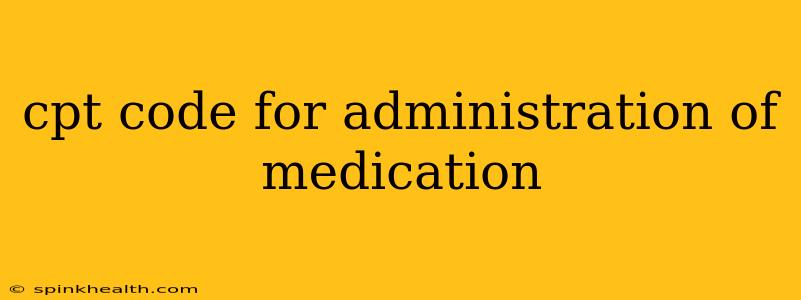Decoding the Mystery: CPT Codes for Medication Administration
The world of medical billing can feel like navigating a labyrinth, especially when it comes to CPT codes. Finding the right CPT code for something as seemingly simple as administering medication can be surprisingly complex. Let's unravel this mystery together, starting with the understanding that there isn't one single CPT code for all medication administrations. The correct code depends heavily on the specifics of the situation. Think of it like this: administering an IV antibiotic is vastly different from giving a patient a single oral pill.
This journey begins with understanding the fundamental principle: CPT codes reflect the services provided, not the medications themselves. The medication itself isn't billed directly using CPT codes; instead, the code reflects the skill and time invested by the healthcare professional in administering the drug.
What Factors Determine the CPT Code?
Several factors influence the CPT code you'll use for medication administration. These include:
-
Route of Administration: Is the medication given orally, intravenously (IV), intramuscularly (IM), subcutaneously (SC), topically, or via another route? Each route requires a different level of skill and time commitment.
-
Complexity of Administration: A simple oral medication requires far less time and skill than administering a complex IV infusion or managing a central venous catheter.
-
Type of Medication: While the medication itself isn't directly coded, the type might influence the complexity. For instance, administering chemotherapy requires specialized knowledge and precautions, compared to giving a routine pain reliever.
-
Setting of Care: The location of the administration (e.g., hospital inpatient, outpatient clinic, physician's office) might impact the applicable code.
Common CPT Codes Associated with Medication Administration
While there's no single "catch-all" code, here are some commonly used CPT codes related to medication administration, keeping in mind these are examples, and the correct code must be chosen based on the specific scenario:
96360-96379: These codes generally cover intravenous (IV), intramuscular (IM), and subcutaneous (SC) injections and infusions. The specific code within this range depends on the complexity and time involved. For example:
-
96360: Might represent a single, simple injection, such as a flu shot.
-
96379: Could be used for a more complex intravenous infusion requiring significant time and skill.
96372: This code is often used for subcutaneous and intramuscular administration of medications that require more time and monitoring.
96413: This code is for the intravenous or intramuscular administration of chemotherapy drugs. Chemotherapy adminstration requires specific protocols, careful monitoring, and often extended time, hence the different code.
99354, 99355 and others: Depending on the context of the visit and the complexity of the medication administration, codes for evaluation and management (E&M) services may also be appropriate, particularly if a substantial amount of time is dedicated to assessment, education or other related services.
How Do I Find the Right CPT Code?
This is where meticulous documentation comes into play. The medical record must clearly detail the medication administered, the route of administration, and the time involved. Ambiguity can lead to incorrect coding and claim denials. Consult the most current CPT codebook or a reliable medical billing resource to determine the appropriate code based on the specific service performed. Professional medical coders are invaluable for accurately and efficiently selecting the correct CPT codes.
What if a medication is administered as part of another procedure?
Often, medication administration is bundled into another procedure. For instance, the administration of antibiotics during surgery would typically not be coded separately but is included in the surgical CPT code.
Remember, this information is for educational purposes only and should not be considered a substitute for professional medical coding advice. Always consult the current CPT codebook and seek guidance from qualified billing specialists to ensure accurate coding.

